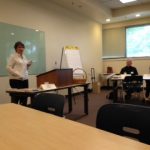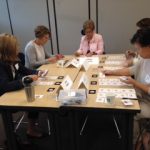 Recently I experienced the most-dreaded of working mother maladies – the child care provider’s vacation. In order to cobble together coverage for the week, I had to bring my nine-year old daughter, Cameron, to a not-for-profit Board meeting with me one evening.
Recently I experienced the most-dreaded of working mother maladies – the child care provider’s vacation. In order to cobble together coverage for the week, I had to bring my nine-year old daughter, Cameron, to a not-for-profit Board meeting with me one evening.
During the meeting, I thought Cameron was deeply engrossed in her online math homework. However, after the meeting, before we even got to the car, she had me deep in a discussion about whether only people as rich as Bill Gates could donate money to make lives better (in addition to telling her that many people practice philanthropy, I felt compelled to remind her Melinda was just as rich as Bill!) and how she could help other children in her community.
While my husband and I do involve Cameron in our personal philanthropy, I realized then that she may be ready to participate on a deeper level. It turned out that my child care provider’s vacation was a gift to our family, because it offered another opportunity to discuss philanthropy and family values with my young daughter.
Last week Anne Knapp, the Director of Philanthropic Initiatives at Woodland Park Zoo, offered the same opportunity to WWF members. Anne led a two-hour workshop for women interested in grounding their philanthropy in their personal values. Anne also gave us tools for broadening the conversation about values and philanthropy to include members of our families.
Anne’s workshop was based upon the research and writing of Dennis Jaffe, PhD (www.dennisjaffe.com). According to Dr. Jaffe, values are important because:
- Values are the internal guides to our behavior.
- Values are somewhat consistent but can change over time, as we grow and mature.
- By reviewing out past and current values we can identify what values we want to guide our future actions.
- Values are aspirational. People are never perfect. Values wouldn’t be important if they were easy to live by.
As I reflected on my personal values during the workshop, I was struck by how those values don’t always translate into my philanthropy. For example, I value life-long learning and education, which is why I enjoy learning new things and impress the importance of education upon my daughter. Interestingly, however, I donate more frequently to human services organizations than educational organizations.
What are your values? How do your values guide your philanthropic choices (or not)? How do your values show up in the work that we do collectively at Washington Women’s Foundation? How would you like for them to show up?
Selections from Anne Knapp’s Recommended Reading List
Cochell, Perry and Rod Zeeb. Beating the Midas Curse
Gallo, Eileen, Jon J. Gallo, and Kevin J. Gallo. Silver Spoon Kids: How Successful Parents Raise Responsible Children
Gates, William H. and Mary Ann Mackin. Showing Up for Life: Thoughts on the Gifts of a Lifetime
Gottman, John, Ph.D. and Joan Declaire. Raising An Emotionally Intelligent Child: The Heart of Parenting
Grubman, James, Ph. D. Strangers in Paradise: How Families Adapt to Wealth Across Generations
Jaffe, Dennis, Ph.D. Stewardship In Your Family Enterprise: Developing Responsible Family Leadership Across Generations
Twist, Lynne. The Soul of Money: Reclaiming the Wealth of Our Inner Resources
Through our groundbreaking model of women-powered, collective philanthropy, Washington Women’s Foundation has given out $15 million in transformational grants that enable not-for-profit organizations to improve lives, protect the environment, advance health and education and increase access to the arts throughout Washington state.
We invite all women to join us to make a more powerful impact in our community. The challenges ahead of us are never as great as the power behind us. www.wawomensfdn.org


Without a doubt, our children learn if and how to give by watching us. I always credit my parents for the work I do in my community. I explain that they were not “shoe inspectors”. When there was a need, when someone had to raise their hand to do something–be it for the church, school, Scouts, or community–they didn’t look at their shoes and wait for someone else to volunteer. Their hand went up. By observing first hand what impact their involvement had in my school or Scout troop, or watching the amazing development of our local museum as they worked tirelessly there, I found that as an adult, I was also ignoring my shoes. What a gift they gave me.
And while I agree that our personal values play a large role in where we choose to focus our giving, I also understand your gifts to human services. A new book for a child in a home devoid of books, or an after school art program is wonderful stuff, But the hungry child too often lacks the energy or interest to participate or even to focus on such things. How much more fulfilling and effective are the growth programs that lift our kids beyond the basics in life…when the kids actually have the basics for life? We must absolutely fund the arts and education and all the things that make our children into the people we want them to become. But we have to nourish them, feed the babies (and the moms!) and put a roof over their heads, too. Then the impact of donations to the “next levels” of life are multiplied many times over.
I think you are teaching your child exactly the right mix. Supply the absolute necessities, giving with compassion and kindness…but don’t forget there is also color, beauty, warmth and excitement to be had in life and share those, too!